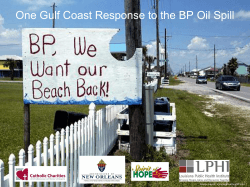
Collaborating on Spill Response
Collaborating on Spill Response Banff Disaster Forum May 12, 2015 Shannon Jarrell Communications & Training Coordinator Western Canadian Spill Services Ltd. (403) 516-8019 Shannon.Jarrell@wcss.ab.ca Learning Outcomes 1. Oil Spill Cooperatives in the upstream petroleum industry are effective 2. Successful response to an inland oil spill in surface water can be attributed to a number of factors 3. The willingness and ability of stakeholders to work collaboratively to make things right can determine the effectiveness of a response Introduction • 18 Oil Spill Cooperatives • Owned and directed by CAPP, EPAC, Pipeline and Independent Companies • 600+ member companies that are licensees of oil wells and pipeline • Source of multiple resources for member companies WCSS Resources Oil Spill Contingency Manuals Oil Spill Support Equipment WCSS Communications Support Training Continuous Improvement Some Lessons Learned Sometimes Overlooked: A Powerful Element of a Successful Response • Collaboration and what it takes: Ø Trust Ø Commitment Ø Understanding of Roles; pre – during – post spill response Ø Effective tools to put it all together Resource Sharing • Many WCSS member companies have opted to purchase their own spill response equipment, but continue to depend on WCSS • Canadian Energy Pipeline Association (CEPA) now have a mutual aid agreement • Local Mutual Aid groups continue to work together on a daily basis Management by Collaboration • It is our belief that effective spill response can be achieved if stakeholders are willing and able to participate in a meaningful, collaborative way.
© Copyright 2025





















